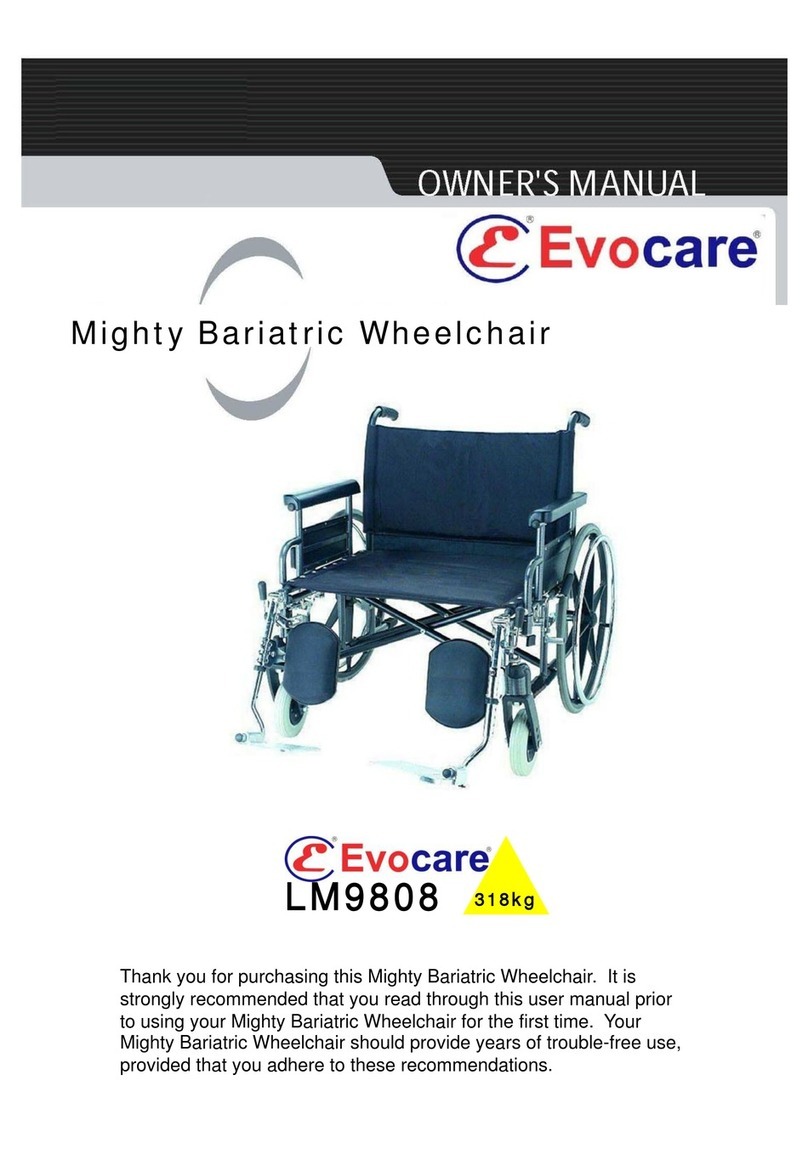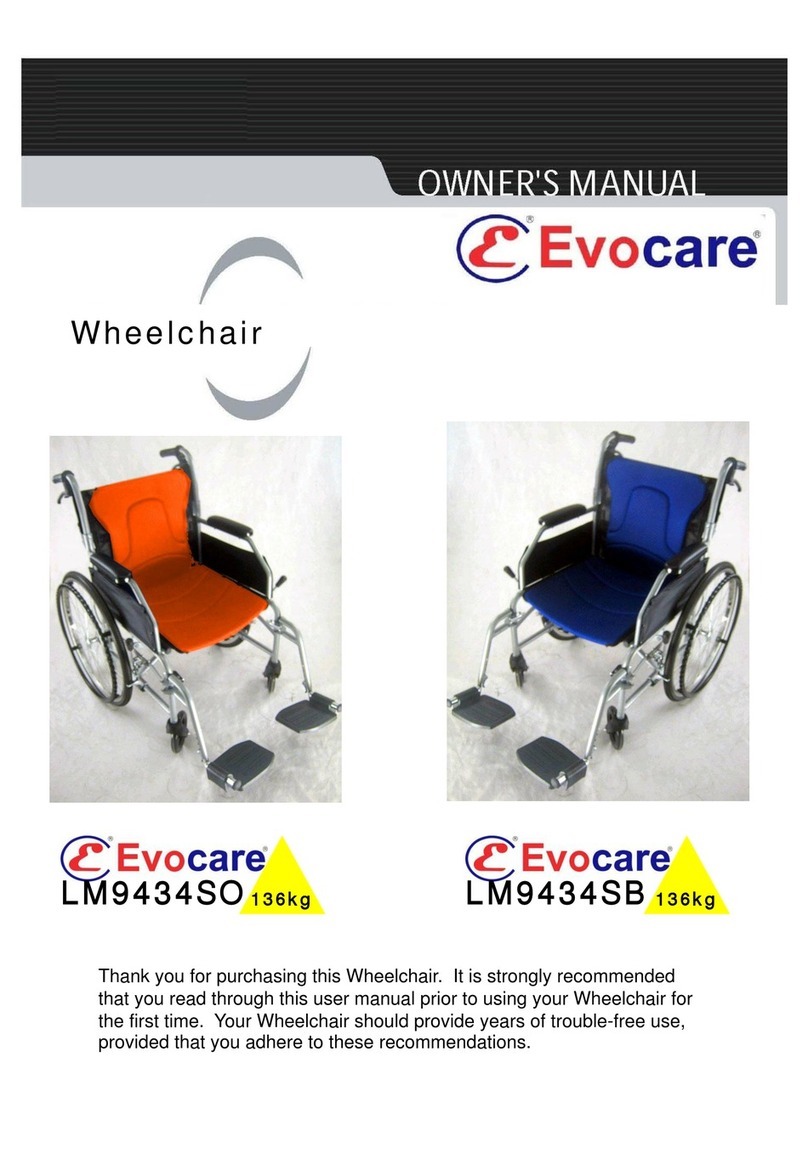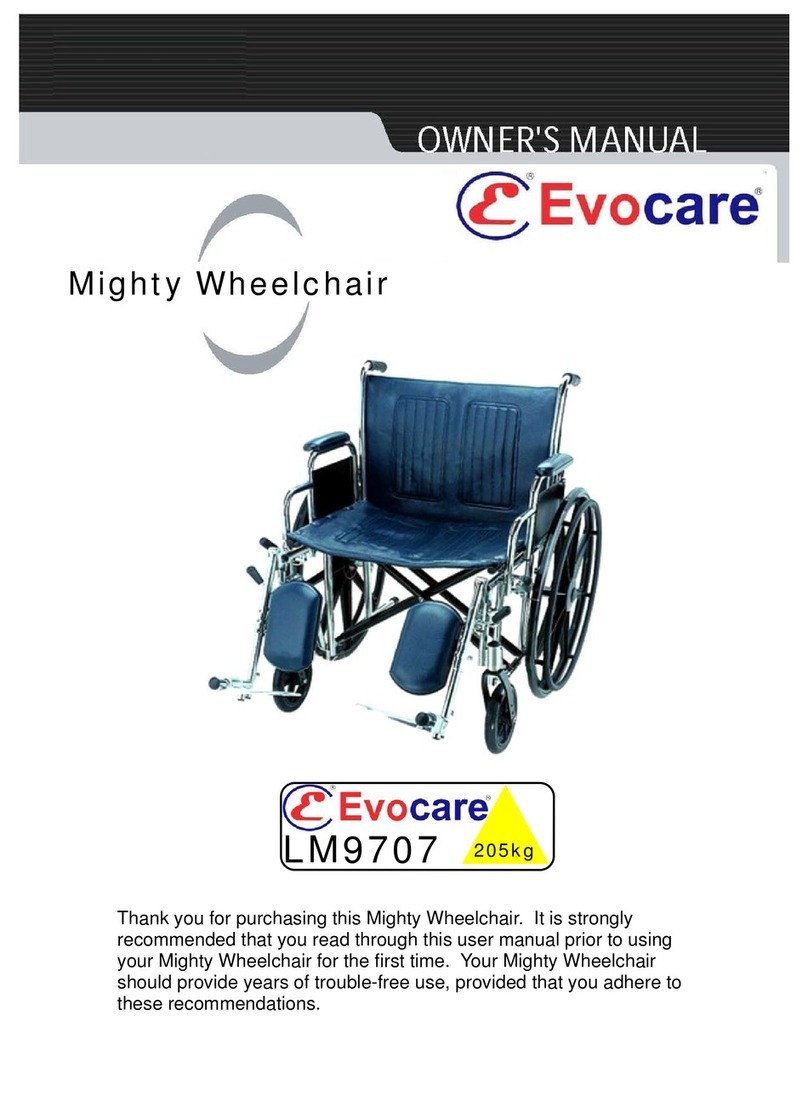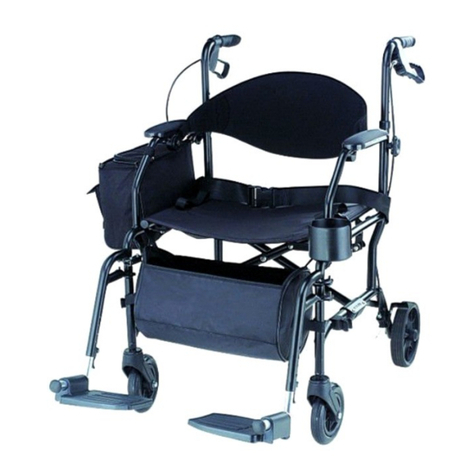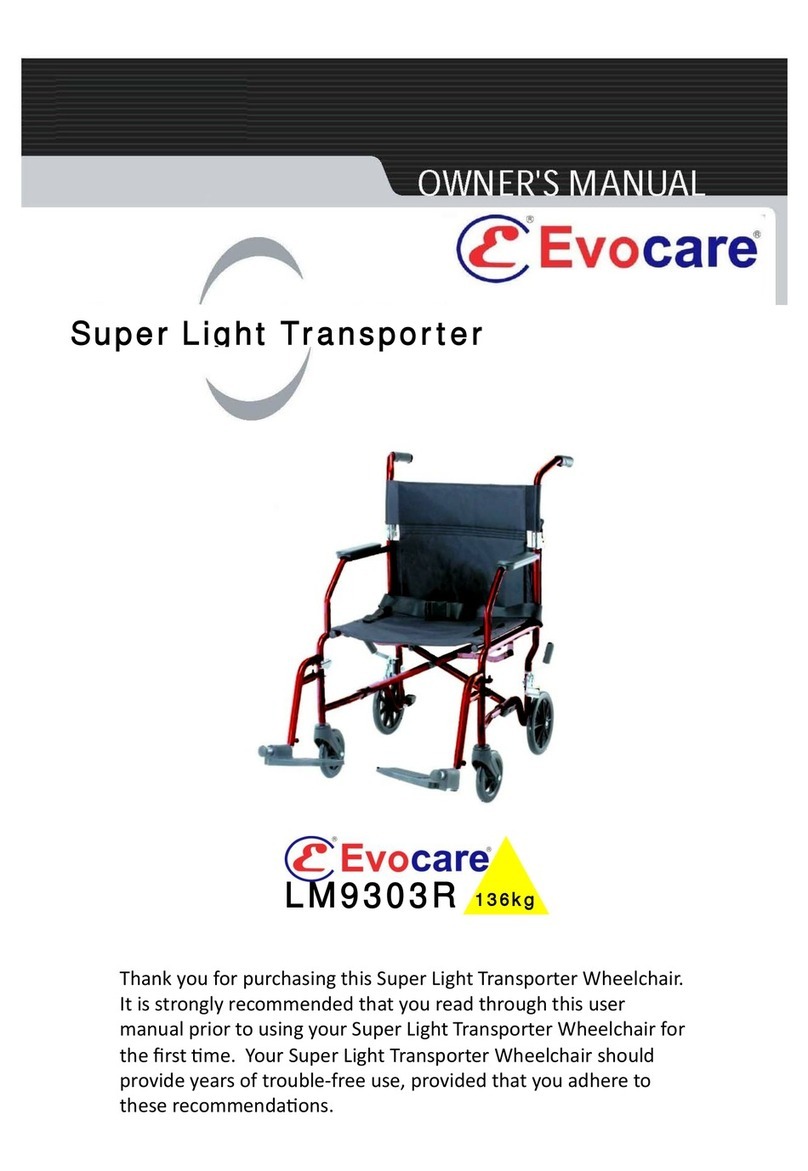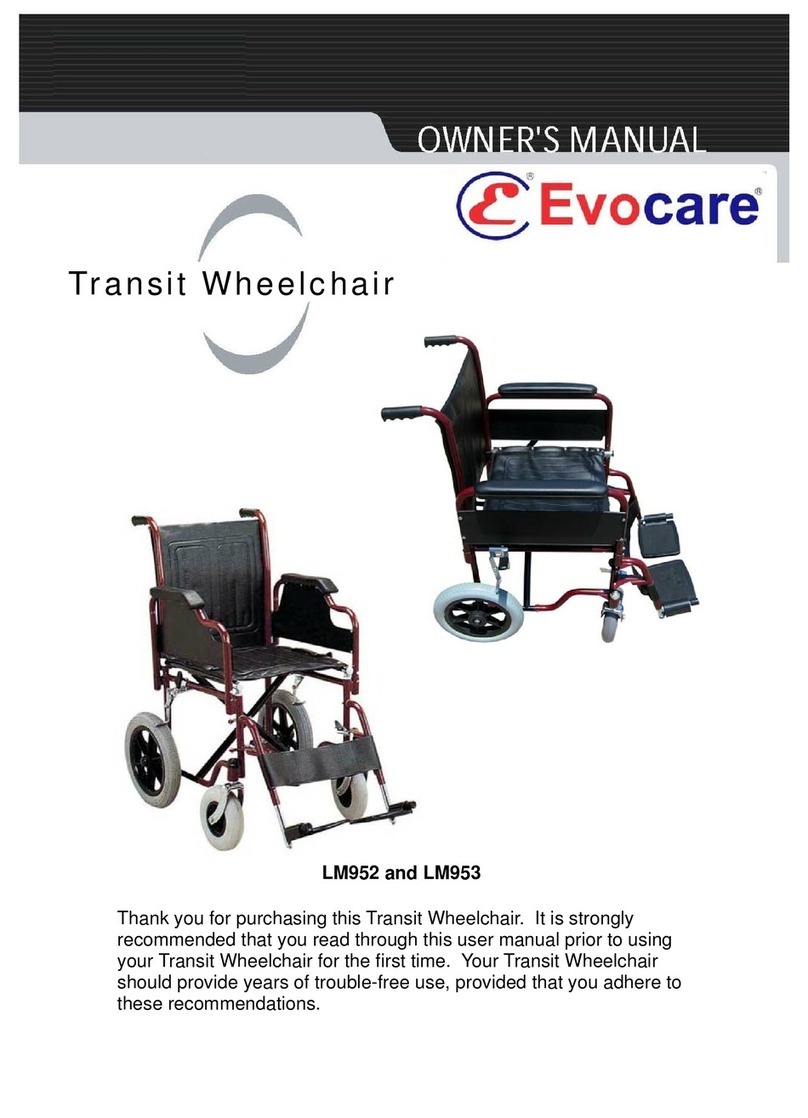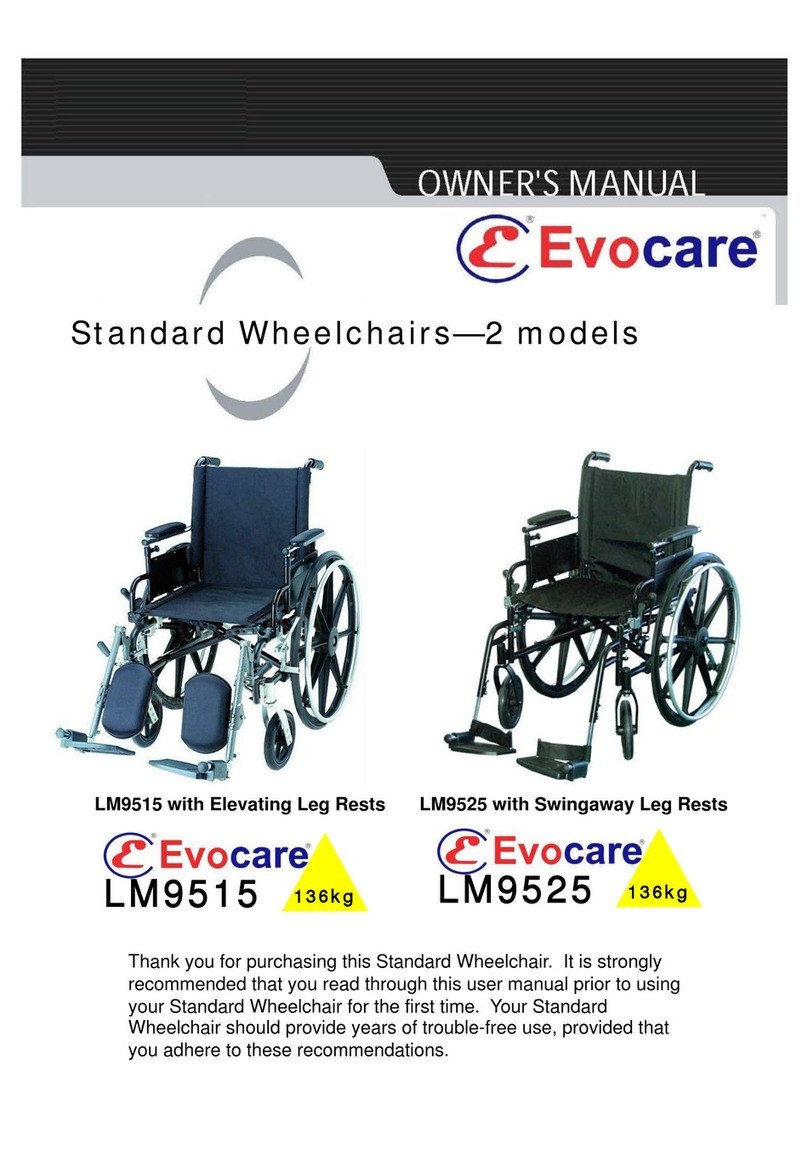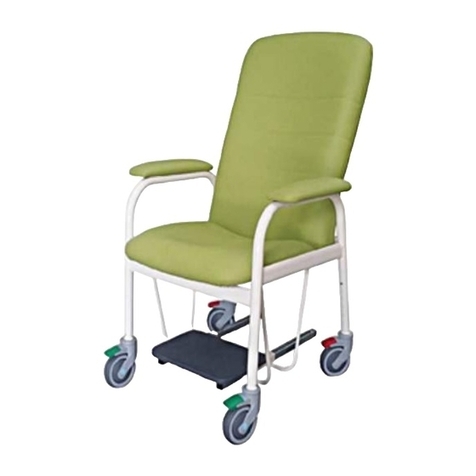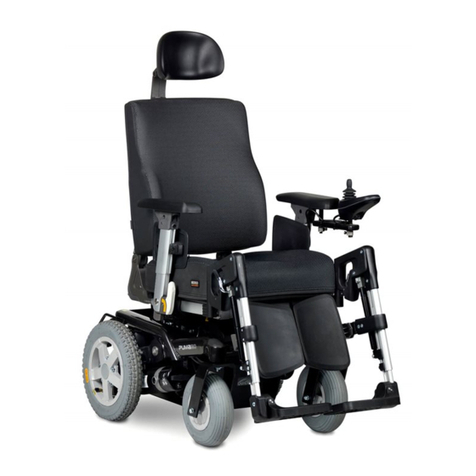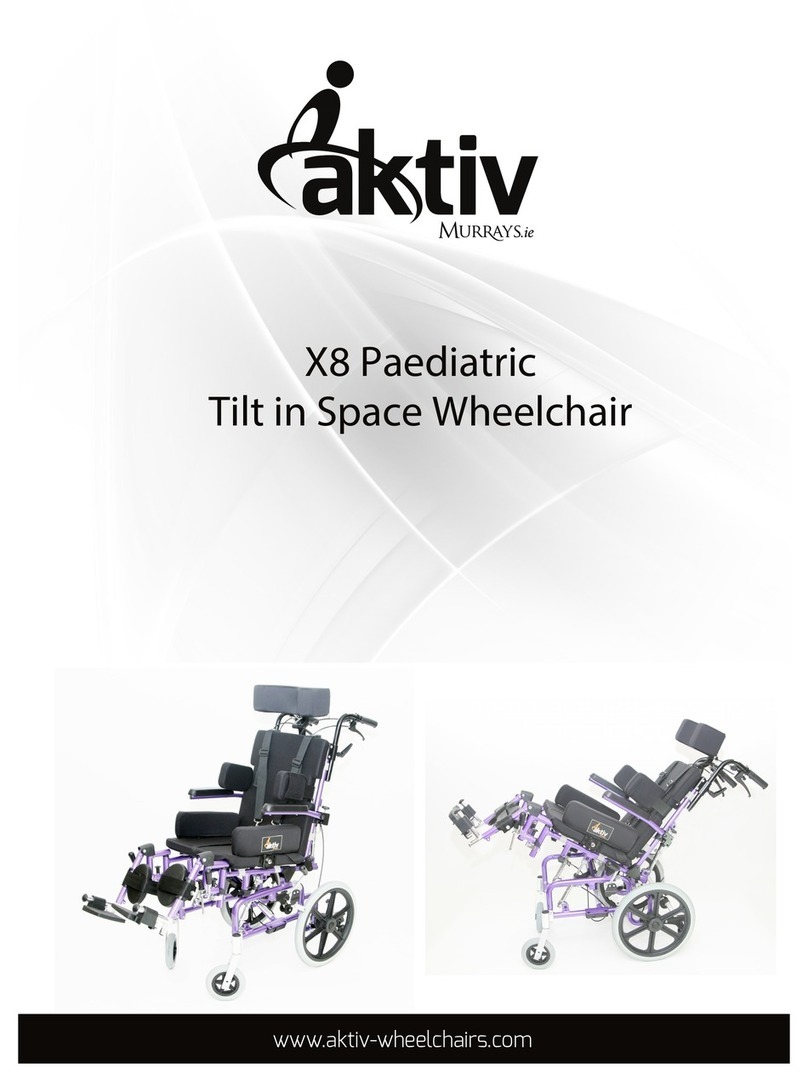Evocare LM9712 User manual

Transport Wheelchair—Aluminium Frame
LM9712
Thank you for purchasing this Transport Wheelchair. It is strongly
recommended that you read through this user manual prior to using
your Transport Wheelchair for the first time. Your Transport
Wheelchair should provide years of trouble-free use, provided that
you adhere to these recommendations.


Page 3.
Transport Wheelchair
Note: Maximum user weight for this wheelchair is 100kg
Evocare is a quality endorsed company and supplies equipment listed with the
Therapeutic Goods Administration.
The ARTG number for the LM9712 Transport Wheelchair is 175495.

Page 4.
Safety / Handling of Transport Wheelchairs
Safety and handling of the transport wheelchair requires the close attention of the
transport wheelchair user as well as the assistant. This manual points out the
most common procedures and techniques involved in the safe operation and
maintenance of the transport wheelchair. It is important to practice and master
these safe techniques until you are comfortable in manoeuvring around the
frequently encountered architectural barriers.
Use this information only as a basic guide. The techniques that are discussed on
the following pages have been used successfully by many users.
Individual transport wheelchair users often develop skills to deal with daily living
activities that may differ from those described in this manual. All warnings and
cautions given in this manual MUST be followed.
Techniques in this manual are a starting point for the new transport wheelchair
user and assistant with safety as the most important consideration for all.
Stability and Balance
To assure stability and proper operation of your transport wheelchair, you must at
all times maintain proper balance. Your transport wheelchair has been designed
to remain upright and stable during normal daily activities as long as you do not
move beyond the centre of gravity.
Virtually all activities which involve movement in the transport wheelchair have an
effect on the centre of gravity. Use the adjustable seatbelt for additional safety.
DO NOT lean forward out of the transport wheelchair any further than the length
of the armrests. Make sure the castors are pointing in the forward position
whenever you lean forward. This can be achieved by advancing the transport
wheelchair and then reversing a little in a straight line.

Page 5.
Operating Instructions
To determine and establish your particular safety limits, practice bending,
reaching and transferring activities in several combinations in the presence of a
qualified health professional before attempting active use of the transport
wheelchair.
ALWAYS check hand grips for looseness before using the transport wheelchair. If
loose and/or worn, replace immediately.
If the transport wheelchair is exposed to extreme temperature (above 38°C or
below 0°C), high humidity and/or becomes wet, prior to use, ensure hand grips
DO NOT twist on the transport wheelchair handle—otherwise damage or injury
may occur.
DO NOT attempt to reach objects if you have to move forward in the seat as this
may tip the wheelchair.
DO NOT attempt to reach objects if you have to pick them up from the floor by
reaching down between your knees as this may tip the wheelchair.
DO NOT lean over the top of the back upholstery to reach objects behind you, as
this may tip the wheelchair.
DO NOT shift your weight or sitting position toward the direction you are
reaching, as this may tip the wheelchair.
DO NOT tilt the transport wheelchair without assistance.
DO NOT use an escalator to move a wheelchair between floors—serious injury
may occur.
NEVER leave an unoccupied transport wheelchair on an incline.
DO NOT attempt to stop a moving transport wheelchair with the wheel locks.
Wheel locks are not brakes.
Before attempting to transfer in or out of the transport wheelchair, every
precaution should be taken to reduce the gap distance. Turn both castors parallel
to the object you are transferring onto. When transferring to and from the
transport wheelchair, ALWAYS lock both hand brakes (locks) before transferring
to and from the transport wheelchair.
DO NOT sit or transfer into the transport wheelchair unless it is fully open.
DO NOT operate on roads, streets or highways.
DO NOT climb, go up or down ramps or traverse slopes greater than 9°.
DO NOT attempt to move up or down an incline which has a film of water, ice or
oil on it.
DO NOT attempt to ride over kerbs or obstacles. Doing so may cause your
transport wheelchair to tip, causing bodily harm or damage to the wheelchair.
DO NOT over tighten hardware attaching to the frame. This could cause damage
to the frame tubing.

Page 6.
Using the Stepper Tube
Use the stepper tube to raise the front castors (when mounting a low kerb for
example). To use, push down on the stepper tube with your foot. DO NOT raise
the front castors by pushing down on the push handles as this could tip the
wheelchair.
To mount a low kerb. Approach the low kerb head on. Then the assistant uses
the stepper tube to raise the front castors, and lowers the front castors on the
raised kerb. Finally the assistant should push the wheelchair forward, lifting it up
slightly to mount the kerb if required.
To go down a low kerb. Line up the front castors with the edge of the low kerb.
The assistant uses the stepper tube to raise the front castors and tip the users
back slightly. Keeping the castors raised slowly move the wheelchair forward and
slowly lower it down the low kerb.
Warning: When going down a low kerb, the front castors must be raised to
prevent the user from falling forward. The above are only recommendations and
may not be suitable for all events.

Page 7.
WARNING
After any adjustments, and before use, make sure all attaching hardware is
tightened securely. Otherwise, injury or damage may result.
Installing Swingaway Removable Legrest Assembly
NOTE: For this procedure refer to FIGURE 1.
1. Turn the footrest to the side (open footplate perpendicular to transport
wheelchair).
2. Install the hinge plates on the footrest
onto the hinge pins on the transport
wheelchair frame.
3. Push the footrest towards the inside
of the transport chair until it locks into
place.
NOTE: The footplate will be on the inside
of the transport wheelchair when locked in
place.
4. Repeat this procedure for the other
footrest assembly.
5. To release the footrest, push the
footrest release lever inward, rotate
the footrest outward.
Adjusting Footplate Height
NOTE: For this procedure, refer to FIGURE 2.
This needs to be done BEFORE using the wheelchair. For your convenience you may find that
the bolt at the bottom of the footplate is loosened so you may adjust then tighten before use.
1. Remove the swing-away footrest assembly.
NOTE: lay the assembly on a flat surface to simplify this procedure.
2. Loosen, but DO NOT remove, the
footplate mounting bolt until the
footplate assembly moves freely.
3. Reposition the footplate assembly to
the desired height.
4. Securely tighten the footplate
mounting bolt.
5. Repeat this procedure for the other
footrest, if necessary.
6. Reinstall the swing-away footrest
assembly.

Page 8.
WARNING
After any adjustments, and before use, make sure all attaching hardware is
tightened securely. Otherwise, injury or damage may result.
Locking / Unlocking / Using Hand Brakes
Locking Hand Brake
NOTE: For this procedure refer to FIGURE 3.
1. Push down on the bottom portion of the brake handle until an audible click is
heard.
Unlocking Hand Brake
NOTE: For this procedure refer to FIGURE 3.
1. Pull up on the top portion of the brake handle to release.
2. Release the brake handle.
Using Hand Brake
NOTE: For this procedure refer to FIGURE 3.
1. Pull up on the top portion of the brake handles toward the push handles.
2. Do one of the following:
Remain stationary—Hold the brake handle up.
Continue mobility—Release the brake handle.

Page 9.
Adjusting Hand Brakes
NOTE: Counterclockwise / clockwise directions are determined by standing behind the Transport
Wheelchair (user’s position)
Adjusting Brake Handle
NOTE: For this procedure refer to FIGURE 4.
NOTE: Test brake handle. Observe how the brake lever
engages the wheel. If the tension of the brake is to loose or
too tight, adjust using the following steps:
1. Loosen the brake handle adjustment nut by turning
clockwise.
2. Perform one of the following:
Loosen brake handle tension—Turn the brake
handle nut clockwise.
NOTE: If the brake lever is scraping the rear wheel, the brake handle must be loosened.
Tighten brake handle tension—Turn the brake handle nut counterclockwise.
NOTE: If the brake lever does not respond quickly, tighten brakes.
3. Turn the brake handle adjustment nut counterclockwise to secure in place.
4. Do one of the following:
Acceptable tension—Repeat STEPS 1 to 3 for opposite side, if necessary.
Unacceptable tension—Repeat STEPS 1 to 3.
Adjusting Cable Adjuster Unit
NOTE: For this procedure refer to FIGURE 5.
NOTE: Test the brake with the brake handle. Observe how
the brake lever engages the wheel. If the tension of the brake
handle is still too loose or too tight, adjust using the following
steps:
1. Ensure brake handle is not locked.
2. Do one of the following:
To loosen: Brace the lock nut while turning the
adjustment screw clockwise.
To tighten: Brace the lock nut while turning the
adjustment screw counterclockwise.
3. Repeat with the other brake.
Adjusting Wheel Lock
NOTE: For this procedure refer to FIGURE 6.
1. Loosen the bolt and locknut that secure the wheel lock assembly to the Transport Wheelchair
frame.
2. Adjust the position of the wheel lock until the
measurement between the rear wheel and the
wheel lock shoe is between 4mm and 8mm.
3. Securely tighten the bolt and locknut.
4. Engage the wheel lock.
5. Push against the transport chair and determine if
the wheel lock engages the wheel lock shoe
enough to hold the Transport Wheelchair.
6. Repeat the above procedures until the wheel lock
holds the Transport Wheelchair.
7. Repeat STEPS 1 to 6 for the opposite wheel
lock.

Page 10.
WARNING
After any adjustments, and before use, make sure all attaching hardware is
tightened securely. Otherwise, injury or damage may result.
Replacing Seat Upholstery
NOTE: for this procedure, refer to FIGURE 9.
1. Remove the screws that secure the
existing seat upholstery to the
crossbraces.
2. Remove the existing seat upholstery from
the crossbraces.
3. Securely tighten the new seat upholstery
to the crossbraces with the screws.
Unfolding / Folding the Fold-Down Back
NOTE: For this procedure refer to FIGURE 7.
Folding
1. Disengage the release mechanism on the back
frame tubes.
2. Push the handles down.
Unfolding
WARNING
When unfolding the back, ensure all
occupant’s and/or assistant’s body parts
are away from the folding mechanism.
Otherwise, pinching and injury may occur.
Make sure the release levers are securely
locked in place before using the transport
wheelchair.
1. Pull up on the two back frame tubes until the
release mechanisms lock in place.
NOTE: There will be an audible click.
2. Pull on the handles to make sure the back is
locked in place.
Replacing Back Upholstery
NOTE: For this procedure, refer to FIGURE 8.
1. Remove the screws and washers that secure the
existing back upholstery to the back frame tubes.
2. Position new back upholstery on the back frame
tubes.
3. Securely tighten the new back upholstery to the
back frame tubes with the screws and washers.

Page 11.
WARNING
After any adjustments, and before use, make sure all attaching hardware is
tightened securely. Otherwise, injury or damage may result.
CAUTION
As with any vehicle, the wheels and tyres should be checked periodically for
cracks and wear, and should be replaced when necessary.
Replacing / Adjusting Front Forks
NOTE: For this procedure, refer to FIGURE 10.
Replacing
1. Remove the castor from the fork.
2. Remove the dust cover.
3. Remove the locknut and nylon washer
that secure the fork to the castor head-
tube.
4. Drop the fork out of the castor head-tube.
5. Slide the new fork into the castor head-
tube and reassemble by reversing STEPS
1 to 4.
6. Adjust the forks.
7. Repeat STEPS 1 to 6 for the opposite
fork, if necessary.
Adjusting
1. Remove the dust cover.
A. To properly tighten the castor
journal system and guard against
flutter, perform the following check:
B. Tip the transport wheelchair back
to the floor.
C. Simultaneously pivot both forks
and castors to the top of their arc.
D. Let the castor drop to the bottom of
the arc (wheels should swing once
to one side, then immediately rest in a straight downward position).
E. Adjust the locknuts according to freedom of the castor swing.
F. Test the transport wheelchair for manoeuvrability.
G. Readjust the locknuts if necessary, and repeat STEPS C &F until correct.
H. Snap the dust cover over the locknut.
Replacing Front Castors
NOTE: For this procedure, refer to FIGURE 10.
1. Remove the hex screw, washers and locknut that secure the front castor to the fork.
2. Reverse STEP 1 to install new front castor.
3. Repeat STEPS 1 & 2 for the opposite front castor.

Page 12.
WARNING
After any adjustments, and before use, make sure all attaching hardware is
tightened securely. Otherwise, injury or damage may result.
CAUTION
As with any vehicle, the wheels and tyres should be checked periodically for
cracks and wear, and should be replaced when necessary.
Removing / Installing Rear Wheels
NOTE: For this procedure, refer to FIGURE 11.
1. Remove the dust cap (If applicable), hex screw and locknut that secure the rear wheel
and axle spacer to the Transport Wheelchair.
2. Repeat STEP 1 for the opposite rear wheel.
3. To reinstall the rear wheels onto the Transport Wheelchair, reverse STEPS 1 to 2.
NOTE: Make sure the axle spacer is between the rear wheel and the Transport Wheelchair
frame.

Page 13.
LM9712 Wheelchair Parts List

Page 14.
1. Evocare provides consumers with the following warranty in relation to this Product, in addition to complying
with the requirements of any relevant legislation, including the Competition and Consumer Act2010 (Cth) in
Australia and the Consumer Guarantees Act 1993 in New Zealand (the Acts), except where a New Zealand
consumer acquires the Product for the purposes of a business.
2. In this warranty, we have used the following definitions:
(a) Form means a warranty claim form issued by Evocare in respect of Products;
(b) Evocare or our means Evocare Australia Pty Limited, ABN 98 078 566 604 of Level 19, 144 Edward Street,
Brisbane 4000;
(c) Products means the goods manufactured for Evocare (including products manufactured by its contract
manufacturers);
(d) Material means a material or component used by Evocare in the manufacture of the Products;
(e) Retailer means the authorised dealer of Products from whom the Product was purchased;
(f) Warranty Period means the warranty period commencing from the date of purchase of the relevant Product.
If the Product or part (as the case may be) is repaired or replaced, there will be no extension to the original
warranty period; and
(g) Workmanship means the handling, assembly and manufacturing processes performed by or on behalf of
Evocare in order to manufacture the Products.
3. Evocare warrants that for the duration of the Warranty Period, all Products will be free of faults arising from
defects in Workmanship or Materials, on the terms and conditions set out in this warranty.
4. Evocare undertakes that if during the Warranty Period any Product, or any part of a Product, has failed to
operate correctly due to faulty Workmanship or defective Material, it will repair or replace the Product or part
(as the case may be) free of charge provided that the following procedures are met :
(a) The consumer must contact the Retailer or Evocare upon becoming aware of any defect to a Product upon
which the consumer will be required to complete a Form and provide satisfactory proof of purchase.
(b) Evocare will review the Form to determine whether there is a defect, and if so Evocare agrees to (at its option)
repair, replace or supply equivalent goods, or pay the cost of any of those remedies to the consumer.
(c) If Evocare requests the return of the applicable Product or part, the consumer will be responsible for the
collection and freight costs of returning that Product or part to Evocare.
(d) The consumer acknowledges that it is also responsible for the freight costs to deliver any new Product or
replacement part to it.
5. This warranty is in addition to any non-excludable legal rights or remedies conferred on the consumer under
any applicable Act and any similar laws. To the extent permitted by law, Evocare's liability for any non-
excludable condition or warranty is limited to rectifying any defect at its option, as set out in paragraph 4(b).
6. Subject to the requirements of any applicable Act or legislation and to the extent permitted by law, no liability
(whether expressed or implied) of any nature whatsoever, is accepted by Evocare for any consequential loss,
damage or injury arising as a result of any fault in the Products.
7. This warranty does not extend to damage to Products which occurs during transit or transportation, or which is
caused by any abuse, accident or improper installation, connection, use, adjustment or repair or use of goods
otherwise than in accordance with instructions issued by Evocare.
8. The warranty on Products is waived if any addition or attachment to the Products do not have Evocare's
approval or are not sold as Evocare products. The Products are designed to perform specific tasks under
established test loads and unauthorised attachments may produce stresses for which the design is not
appropriate.
9. The following applies to consumers who purchased a relevant Product in Australia:
Our goods come with guarantees that cannot be excluded under the Australian Consumer Law. You are entitled to
a replacement or refund for a major failure and compensation for any other reasonably foreseeable loss or
damage. You are also entitled to have the goods repaired or replaced if the goods fail to be of acceptable
quality and the failure does not amount to a major failure.

Page 15.
Your Evocare Transport Wheelchair is warranted to be free of defects in material and
workmanship for 12 months, for the original consumer.
This warranty does not cover device failure due to owner misuse, negligence, or normal
wear and tear.
The warranty does not extend to non-durable components such as rubber accessories,
brakes and grips, which are subject to normal wear and tear. Non-durable components
are warranted for 3 months.
For more information about your LM9712 Transport Wheelchair, warranty or to order
parts call 07 3355 8007.
Manufactured for:
Evocare Australia Pty Limited, 260 South Pine Road, Enoggera. QLD. 4051.
Phone: 07 3355 8000 FAX: 07 3355 5043
Website www.evocare.com.au
Other Evocare Wheelchair manuals
Popular Wheelchair manuals by other brands
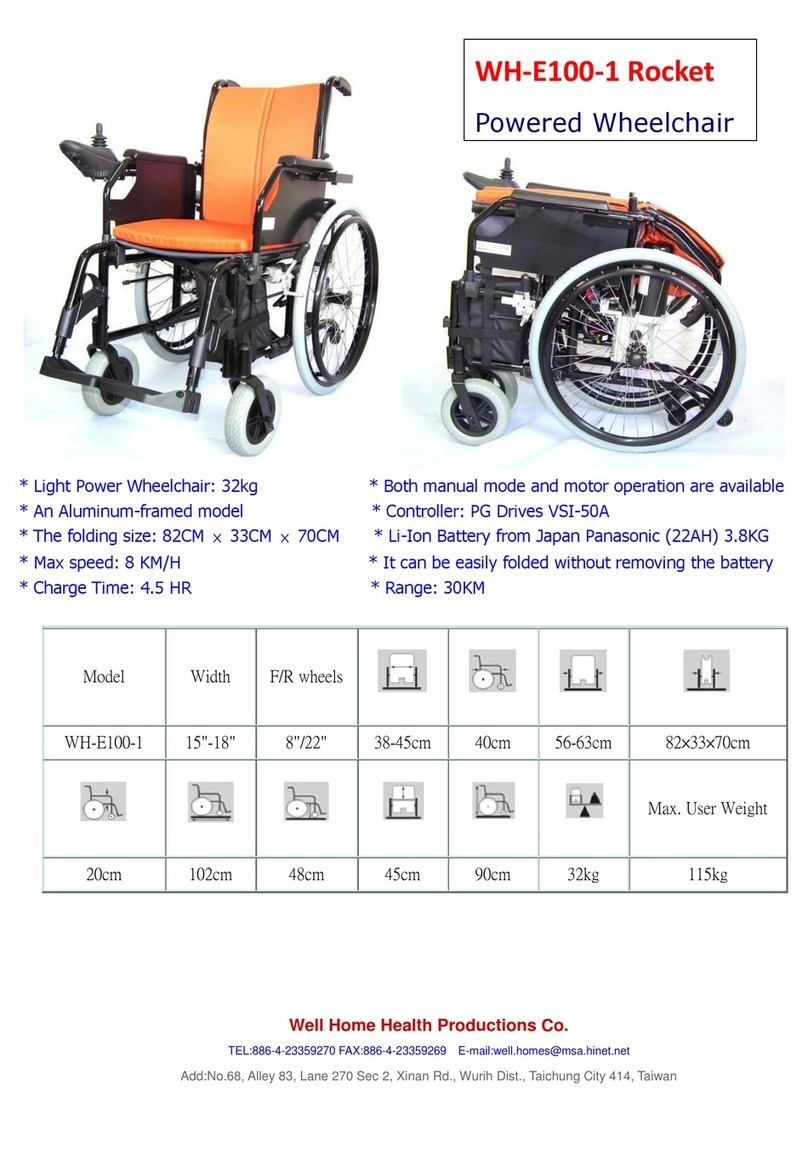
Well Home Health Productions
Well Home Health Productions WH-E100-1 Rocket user manual
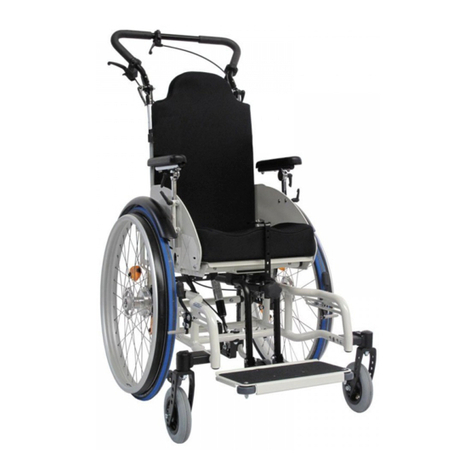
SORG
SORG Tilty vario Instructions for use
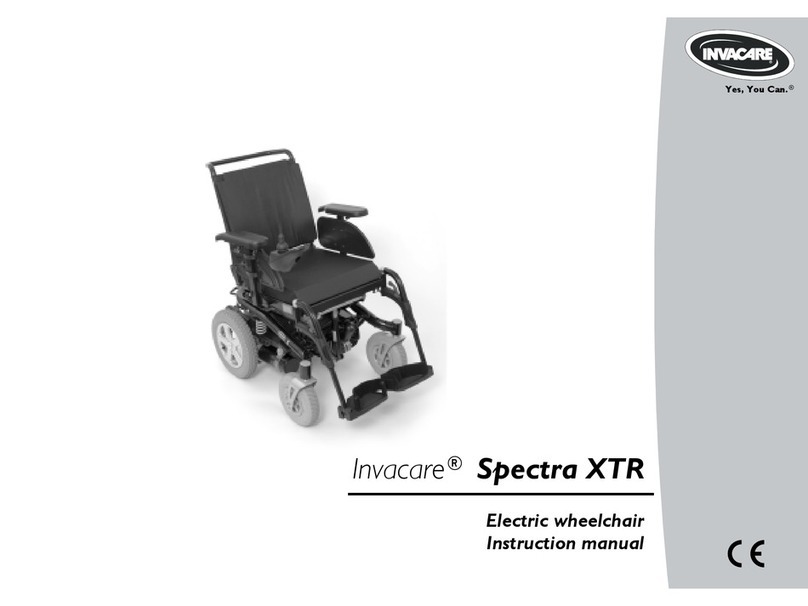
Invacare
Invacare Spectra XTR instruction manual

Drive DeVilbiss Healthcare
Drive DeVilbiss Healthcare DSF 130 Instructions for use
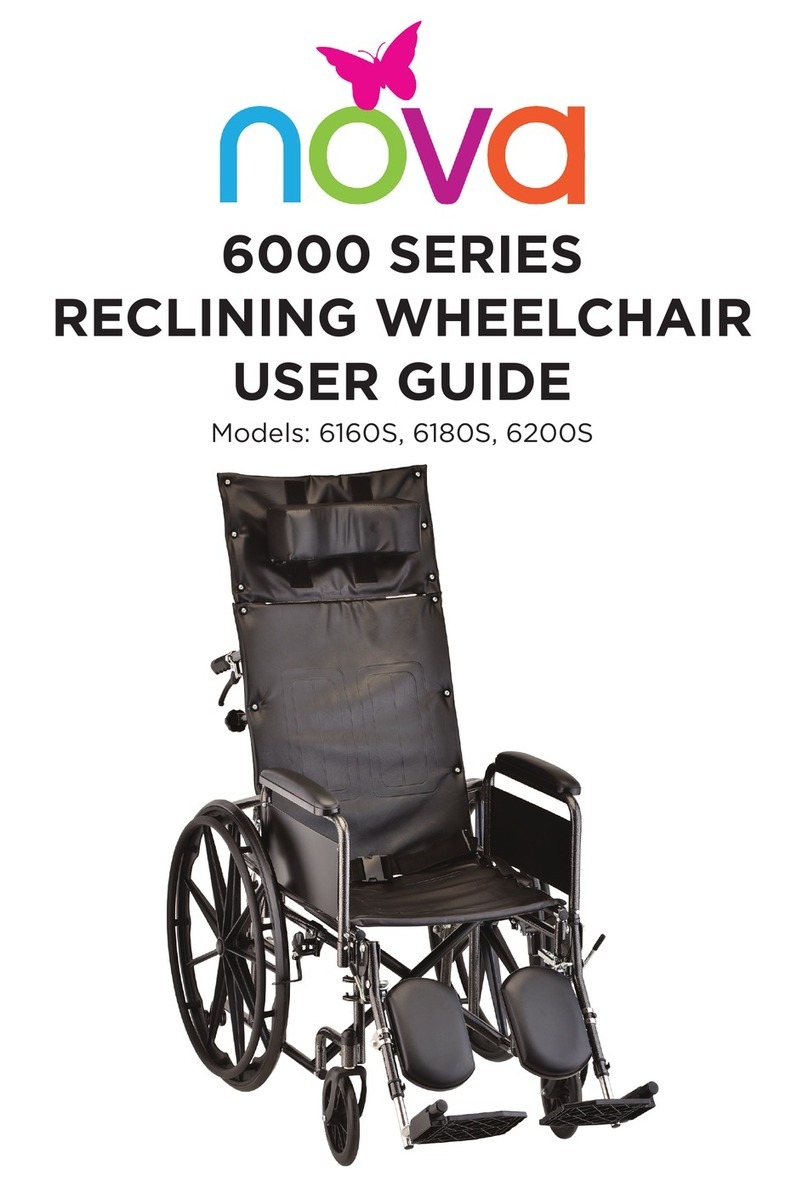
Nova
Nova 6000 Series user guide

DELTA-SPORT
DELTA-SPORT 315318 Instructions for use
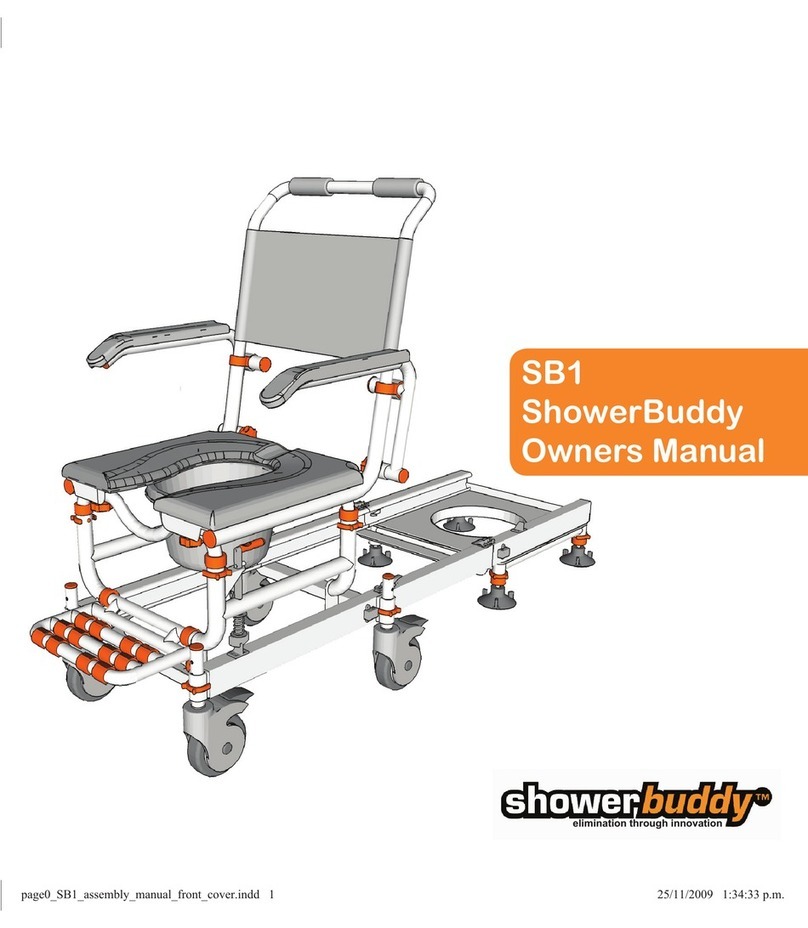
Showerbuddy
Showerbuddy SB1 owner's manual

Vermeiren
Vermeiren Inovys Junior user manual
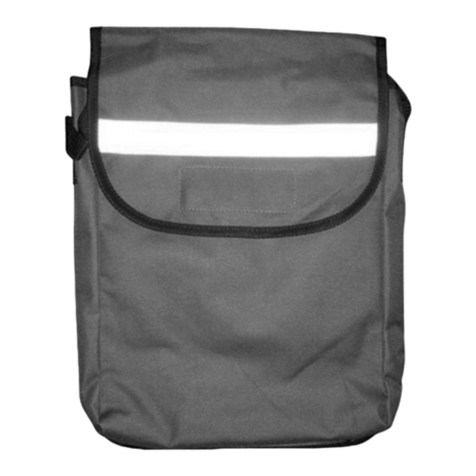
aidapt
aidapt VA135S Fitting and Maintenance Instructions

Sunrise Medical
Sunrise Medical Breezy Ultra 4 Brochure & specs

Permobil
Permobil ConnectMe M400 owner's manual

BraunAbility
BraunAbility RBC Instructions for fitting and use
